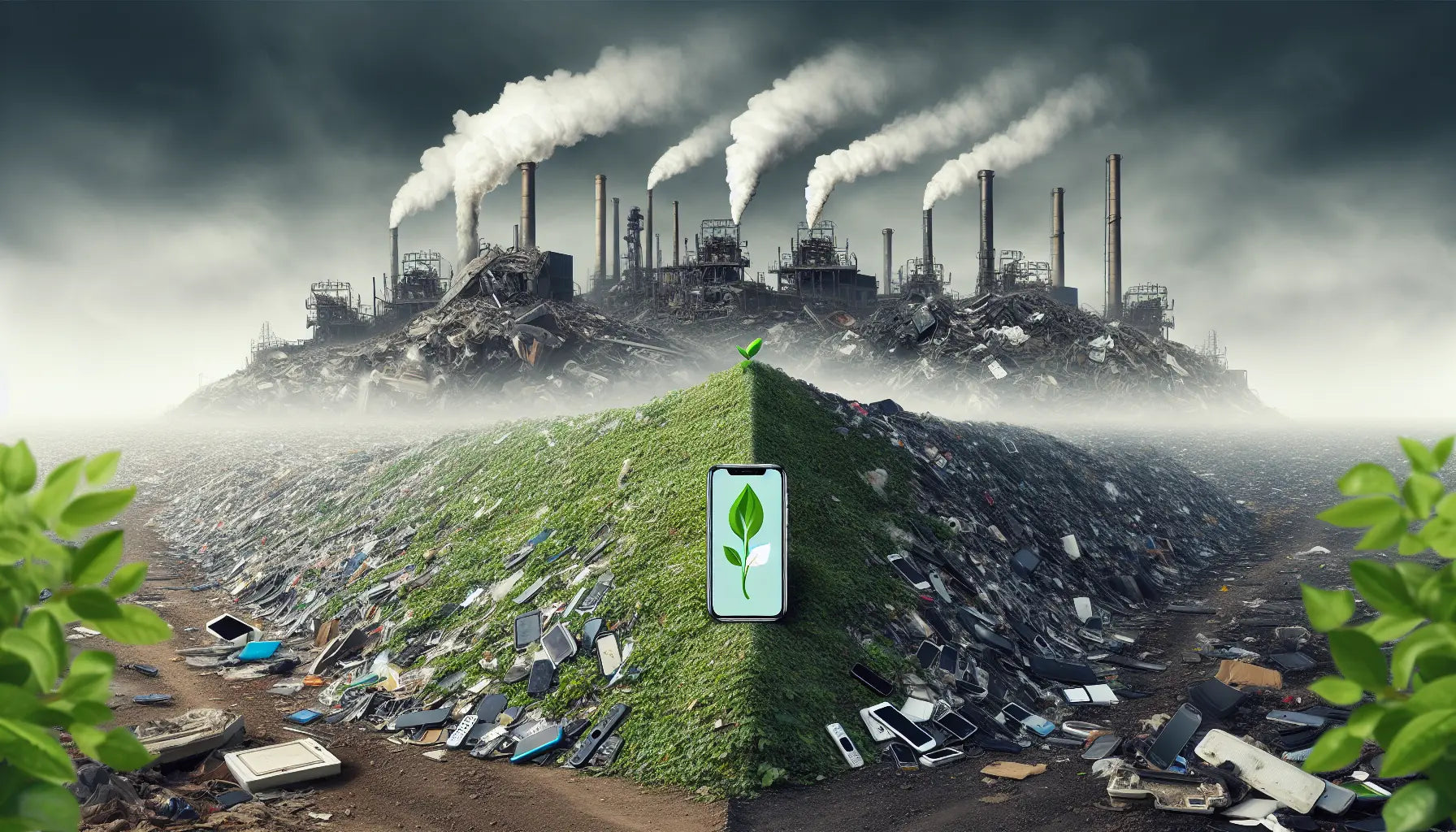Introduction
The issue of smartphones' environmental footprint has become increasingly pertinent in today's society. In our era of rampant consumerism and the incessant pursuit of the latest tech gadgets, it's become imperative for people to grasp the ramifications of their choices on the planet. The manufacturing and disposal processes of smartphones play a substantial role in generating electronic waste (e-waste), a challenge that poses serious environmental threats.
Consumerist tendencies have fostered a throwaway culture, wherein individuals frequently discard their old phones in favor of newer models, thereby exacerbating the e-waste dilemma. This not only fills up landfills at an alarming rate but also introduces toxic substances like lead and mercury into the environment, posing risks to both ecosystems and human health.
Making informed decisions about smartphone consumption is paramount. By supporting ethical alternatives such as Fairphone, consumers can align themselves with companies dedicated to sustainability and ethical production standards. Fairphone stands out in its commitment to crafting smartphones that prioritize environmental friendliness and social responsibility.
Through awareness of the environmental repercussions of smartphone usage and deliberate consumer actions, individuals can play their part in fostering a more sustainable future. In the subsequent sections, we will delve into the intricacies of e-waste management and examine the distinctive features and advantages of Fairphone as a conscientious smartphone option.
Environmental Impact of Smartphone Production
The production of smartphones has a significant environmental impact, affecting various aspects of the planet. Here are some key points to consider:
1. Extraction of Precious Metals and Conflict Minerals
Smartphones require the extraction of precious metals like tin, tungsten, and tantalum, which contribute to habitat destruction and soil erosion. Additionally, the mining of these metals often involves unethical practices, including the use of child labor and funding conflicts in mineral-rich regions.
2. The Use of Non-Renewable Resources
Smartphone production heavily relies on non-renewable resources such as fossil fuels and minerals. The extraction and processing of these resources contribute to air and water pollution, habitat destruction, and the depletion of natural resources.
3. Energy Consumption and Greenhouse Gas Emissions
The manufacturing process of smartphones consumes a significant amount of energy, primarily from non-renewable sources. This energy consumption contributes to greenhouse gas emissions, exacerbating climate change. Additionally, the transportation of smartphones from manufacturers to consumers further adds to the carbon footprint.
4. Water Pollution and Depletion
The production of smartphones involves various chemical processes that can contaminate water sources. Toxic substances used in manufacturing, such as solvents and heavy metals, can leach into waterways, causing pollution and posing risks to ecosystems and human health. Moreover, the production process requires large quantities of water, contributing to water scarcity issues in some regions.
Considering the environmental impact of smartphone production is essential for individuals who want to make sustainable choices. By understanding these issues, consumers can support companies that prioritize ethical sourcing, responsible manufacturing practices, and the use of renewable energy.
The Ethical Smartphone: Fairphone
Fairphone is a company that is committed to producing smartphones with a focus on sustainability and ethical practices. Their mission is to create a positive impact throughout the smartphone supply chain.
One of Fairphone's core values is responsible sourcing. They prioritize working with suppliers who adhere to strict environmental and social standards. By partnering with ethical suppliers, Fairphone aims to minimize the negative impact of smartphone production on the environment and communities.
Transparency is another important aspect of Fairphone's approach. They believe in providing consumers with full visibility into their supply chain, from the extraction of raw materials to the final assembly of the phone. This allows customers to make informed choices and support a more sustainable industry.
A key feature of Fairphone is its modular design. Unlike most smartphones, Fairphone devices are designed to be repairable and upgradable. This extends the lifespan of the phone and reduces electronic waste. Users can easily replace individual components, such as the battery or camera, instead of replacing the entire phone. This not only reduces environmental impact but also saves consumers money in the long run.
By choosing Fairphone, consumers can contribute to a more sustainable future. They support a company that is committed to responsible sourcing, transparency, and repairability. Fairphone is leading the way in ethical smartphone production and setting an example for the industry.
E-Waste Management
The issue of electronic waste, also known as e-waste, is a growing concern in today's world. The production and disposal of smartphones contribute significantly to this problem, causing significant environmental impact.
Improper disposal of electronic waste has severe consequences for the environment. When smartphones end up in landfills, they take up valuable space and can release harmful materials into the soil and water. These materials, such as lead and mercury, can pollute the environment and pose health risks for both humans and ecosystems.
Recycling and proper e-waste management are essential in addressing this issue. By recycling smartphones and other electronic devices, valuable materials can be recovered and reused, reducing the need for new resource extraction and minimizing environmental impact.
Fairphone, a company known for its commitment to sustainability and ethical practices, has implemented a take-back program and recycling initiatives to promote proper e-waste management. Through their take-back program, customers can return their old Fairphone devices, ensuring they are properly recycled and disposed of.
Fairphone's recycling initiatives aim to recover valuable materials from old smartphones. These materials can then be used in the production of new devices, reducing the need for resource extraction and minimizing environmental impact.
By participating in Fairphone's take-back program and supporting their recycling initiatives, individuals can contribute to the proper management of e-waste. This helps reduce the amount of electronic waste ending up in landfills, mitigating the environmental impact and promoting a more sustainable future.
FAQ
1. Can smartphones be environmentally friendly?
Absolutely! Smartphones can indeed be environmentally friendly. It's all about making the right choices. Opting for ethical smartphone options means supporting companies that prioritize sustainability and ethical production practices. One great example is Fairphone, a company committed to creating smartphones that are not only eco-friendly but also socially responsible.
2. How can I make a more responsible smartphone choice?
Making a responsible smartphone choice involves considering a few key factors. Look into the company's commitment to sustainability, responsible sourcing of materials, and transparency in their production processes. Also, keep an eye out for smartphones with modular designs. These are easier to repair and upgrade, extending their lifespan and reducing electronic waste in the long run.
3. What is the environmental impact of smartphone production?
The production of smartphones definitely takes a toll on the environment. From mining precious metals to using non-renewable resources, the process consumes a lot of energy and emits greenhouse gases. It's not just about production though; disposing of old smartphones contributes to e-waste, posing significant environmental challenges.
4. What is Fairphone and how is it different from other smartphones?
Fairphone is a company leading the charge in sustainable smartphone production. What sets them apart is their unwavering focus on sustainability and ethical practices. They prioritize responsible sourcing of materials, maintain transparency throughout their supply chain, and design their phones to be easily repairable. With modular designs, Fairphone devices allow users to replace individual components, reducing both environmental impact and promoting a circular economy.
5. What should I do with my old smartphone?
When it comes to old smartphones, proper disposal is key. Recycling them ensures that valuable materials are recovered and reduces the need for new resource extraction. Fairphone makes this easier with their take-back program and recycling initiatives. They allow customers to return their old devices for proper recycling and disposal, minimizing the environmental footprint of your old phone.






















